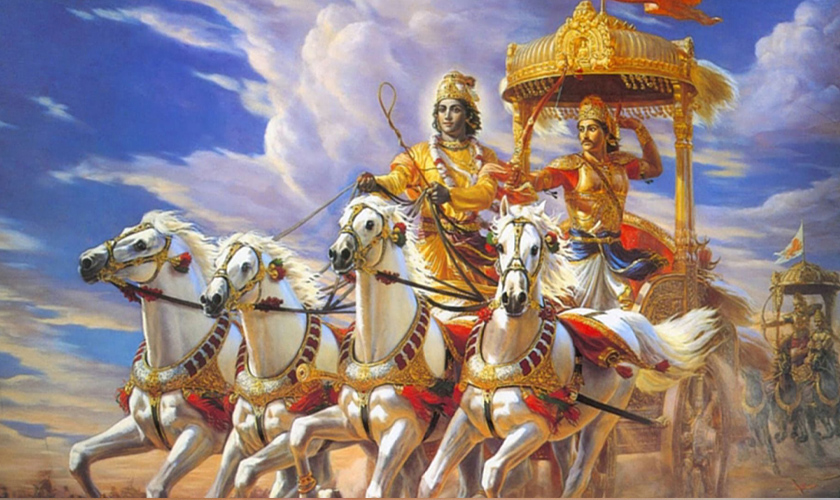One of Hinduism’s most valuable writings, the Bhagavad Gita is regarded as a sacred text that imparts essential lessons about spirituality and the nature of existence. We all need peace and the real meaning of life. Many questions come to our minds about life and death, spirituality, and the purpose of life. We are here to talk about Bhagavad Gita. We will know here what is Bhagavad Gita. How is the Bhagavad Gita important for our lives? At the end of the post, you will realize the importance of the Bhagavad Gita for your personal life self-development, and spirituality.
Bhagavad Gita Book
Bhagavad Gita is one of Hinduism’s most sacred holy books, which has been cherished and studied for a very long time. Many people regard it as a metaphor for the conflict between good and evil. Bhagavad Gita Shloka is the roadmap to gaining spiritual enlightenment. This book relates the lifestyle of every person at all stages of life and gives practical solutions for every problem.
This book was written 5000 years back during Mahabharata, one of the big wars between Pandavas and Kauravas, and narrated by Lord Krishna to Arjuna on the battlefield. The Bhagavad Gita, often referred to as the Gita, is a 700-verse ancient Hindu scripture that is part of the Indian epic Mahabharata. It is a profound philosophical and spiritual text that guides on living a meaningful and purposeful life. The teachings of the Gita transcend time and culture, offering valuable insights that are relevant to the challenges and dilemmas of the modern world.
Bhagavad Gita Compiled By Ved Vyas
The Bhagavad Gita is traditionally attributed to the sage Vyasa, who is also known as Vedavyasa. Vyasa is a revered figure in Hinduism and is considered to be a compiler and transmitter of ancient Vedic knowledge. He is credited with composing many of the sacred texts in Hindu literature, including the Mahabharata, of which the Bhagavad Gita is a part.
Importance of the Bhagavad Gita
Bhagavad Gita is one of the important spiritual texts. This holy book helps us in many ways.
Valuable Guidance for Purposeful Lives
It serves as a reference book for spiritual seekers and imparts valuable guidance for leading purposeful lives. Karma yoga, bhakti yoga, and jnana yoga are the three basic categories into which the Bhagavad Gita’s teachings can be divided. Reading the Bhagavad Gita can offer valuable guidance for living a happy and meaningful life. This book helps to get yourself stress-free and live your life peacefully.
Connect with Spirituality
The Bhagavad Gita quotes are so powerful that it changes your way of thinking. Gradually you will connect with spirituality and get the direction for your life. If you are a spiritual seeker and believe in spirituality you must have this book with you. Tales in the Bhagavad Gita touch all walks of life. People are changing their lives by reading Bhagavad Gita.
The Essence of All Religions
Gita is the essence of all religions. No sect religion has been condemned in this book. It has been said about the progress of mankind. Regardless of religious or spiritual convictions, the book is so popular that even nonhindu read this book and learn the lesson of life.
Gita Jayanti (Gita Mahotsav)
The Bhagavad Gita book full of devotion, knowledge, yoga, desirelessness, etc. is the only book in the world whose birth anniversary is celebrated.
Historical Context of Bhagavad Gita

The Epic Battle of Kurukshetra
The Bhagavad Gita is set against the backdrop of the great battle of Kurukshetra. This book is included in the Mahabharata, an epic that describes a major conflict between two groups of cousins, the Pandavas and the Kauravas. The conflict was viewed as a conflict between good and evil and was waged for control of the Hastinapura kingdom. The Bhagavad Gita takes place on a battlefield,
The Dialogue between Arjuna and Krishna
The dialogue between Lord Krishna and Arjuna, a warrior prince who is grappling with a moral conundrum on the battlefield of Kurukshetra, is part of the epic Mahabharata. Amid this moral crisis, Arjuna seeks guidance from Lord Krishna, his charioteer and a divine incarnation. The dialogue between Arjuna and Krishna forms the core of the Bhagavad Gita, where Krishna imparts profound wisdom and spiritual insights to help Arjuna navigate the complexities of life.
Also Read: The Vedas: Oldest Holy Scripture
Key Teachings of Bhagavad Gita
The Path of Duty and Dharma
Krishna emphasizes the importance of performing one’s duty (dharma) without attachment to the results. He advocates for selfless action and stresses that individuals should focus on their responsibilities rather than being driven by desires and outcomes.
Detachment and Renunciation
Krishna teaches the concept of detachment, highlighting that individuals should engage with the world while remaining unattached to the material outcomes. This detachment leads to inner peace and equanimity, enabling one to face challenges with grace.
The Nature of the Self
Krishna expounds on the eternal nature of the soul (atman) and how it transcends the physical body. He discusses the concept of reincarnation, asserting that the soul is immortal and undergoes multiple lifetimes to fulfil its spiritual journey.
Paths to Liberation
The Gita outlines various paths to attain liberation (moksha), including the paths of devotion (bhakti), knowledge (jnana), and disciplined action (karma). Krishna explains that different individuals have different temperaments and can choose the path that resonates with them.
Also Check:- 18 Puranas in Hinduism
Relevance in the Modern World
Managing Stress and Anxiety
The teachings of the Bhagavad Gita provide practical tools to manage stress and anxiety. By focusing on the present moment and detaching from outcomes, individuals can alleviate their mental burdens and find peace in turbulent times.
Ethical Decision-Making
In a world filled with ethical dilemmas, Gita’s emphasis on righteousness and duty can guide individuals in making ethical decisions. By adhering to their moral compass and prioritizing their responsibilities, they can navigate complex choices.
Balancing Material and Spiritual Pursuits
Modern life often emphasizes material success, leading to a neglect of spiritual well-being. The Gita’s teachings encourage individuals to strike a balance between their material pursuits and their spiritual growth, fostering holistic development.
Embracing Change
Change is inevitable, yet it often brings resistance and fear. The Gita teaches that change is a fundamental aspect of life, and by embracing it with an open heart, individuals can find strength and adaptability even in challenging circumstances.
Purchase Bhagavad Gita Online
If you are struggling with life challenges, if you are living a stressful life, this book will help you to come out of your problems and give solutions. It is highly recommended for the betterment of your life.
Due to its huge popularity, the Bhagavad Gita has been translated into more than 578 languages around the world. The book is available in the ISKCON temple and online marketplaces. You can purchase this book from Iskcon temples or any bookstall. This book can also be purchased online by this link.
Conclusion
The Bhagavad Gita is a timeless spiritual classic that provides helpful advice for leading a purposeful and happy life. Its teachings transcend time and culture, providing a roadmap for navigating the complexities of life with wisdom and grace. By incorporating its teachings, individuals can lead purposeful, balanced, and fulfilling lives in the modern world. People of many faiths and origins can benefit from its teachings, and several components of our society are affected by it. I urge readers to go further into the Bhagavad Gita and learn more about the wisdom it provides.
FAQs
Q1: What is Bhagvad Gita?
A.: The Gita is a dialogue between Lord Krishna and the warrior Arjuna, and it is believed to have been recorded by Vyasa as a part of the larger epic Mahabharata.
Q2: Who Wrote Bhagavad Gita?
A: The Bhagavad Gita is traditionally attributed to the sage Vyasa, who is also known as Vedavyasa.
Q3: How many slokas in Bhagavad Gita?
A: The Gita comprises 700 verses, organized into 18 chapters.
Q4: How many chapters are in Bhagavad Gita?
A: There are 18 Chapters in Bhagavad Gita.
Q5: When was the Bhagavad Gita written?
A: Bhagwad Gita was written 5000 years back during Mahabharata.
Q6: Can the Bhagavad Gita help me find purpose in life?
A: Yes, the Gita offers insights into leading a purposeful life by aligning actions with higher principles.





